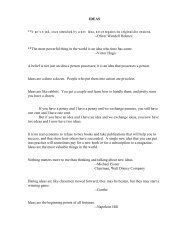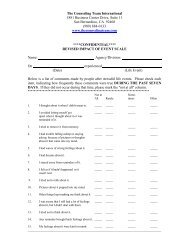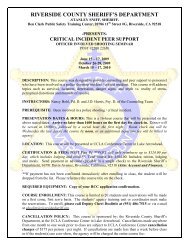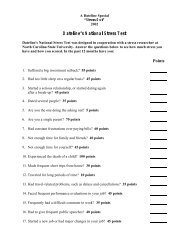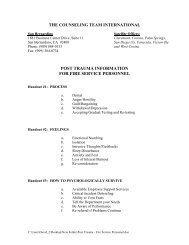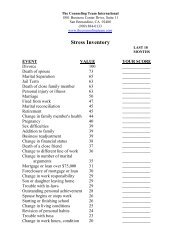Coping with Change.pdf - The Counseling Team International
Coping with Change.pdf - The Counseling Team International
Coping with Change.pdf - The Counseling Team International
Create successful ePaper yourself
Turn your PDF publications into a flip-book with our unique Google optimized e-Paper software.
<strong>The</strong> <strong>Counseling</strong> <strong>Team</strong> <strong>International</strong><br />
1881 Business Center Drive, Suite 11<br />
San Bernardino, CA 92408<br />
(909) 884-0133<br />
www.thecounselingteam.com<br />
<strong>Coping</strong> <strong>with</strong> <strong>Change</strong> – Moving On<br />
Accept Your Emotions: You are experiencing a significant change along <strong>with</strong> a period of<br />
uncertainty. Be honest <strong>with</strong> yourself about how it has affected you.<br />
Control Your Attitude: Your attitude is one of the few things that are totally under your<br />
control. You may not have much influence over what happens at work, but you are completely<br />
in charge of how you react to it. You can brood over what has been lost, or what might go<br />
wrong...you can worry yourself sick. Or, you can search out opportunities, embrace the<br />
challenge, and keep a positive view.<br />
Try To See <strong>The</strong> Big Picture: Although you may now feel the world has come to an end,<br />
it hasn't. Instead of trying to solve everything at once, break down each problem into easily<br />
managed pieces, then take one step at a time.<br />
Expect Some Mood Swings: Be aware that ups and downs are normal during a transition<br />
and usually diminish as you begin to master the challenges posed by the change.<br />
Avoid Withdrawal From Others: You may feel alone in this situation, but in reality<br />
many people have had similar experiences. Sharing thoughts and feelings have a stabilizing<br />
effect.<br />
Beware Of Traps: Traps such as self-pity, self-blame, holding onto the past, listening to<br />
rumors and speculation, or blaming others are common. Try to view this as an opportunity to<br />
learn and grow.<br />
Use <strong>The</strong> <strong>Change</strong>s As An Opportunity To Make Things Better: This is an<br />
opportunity for creative problem solving, to seek out new opportunities for yourself. Look<br />
forward, not backward. Set new personal and professional goals and strive to meet them.<br />
Avoid Making Sweeping <strong>Change</strong>s: You are experiencing a significant change. Don't<br />
initiate other major changes if you don't have to. Keep your life steady for a while.<br />
Expect <strong>Change</strong>, And Be A <strong>Change</strong> Agent: <strong>Change</strong>s are and will continue to take<br />
place. <strong>The</strong> new corporate culture calls for consistent and rapid change. Accept change and be<br />
flexible <strong>with</strong> it. Be a change agent by showing initiative, and being resourceful.<br />
Keep Your Sense Of Humor: Look for humor in those situations that go wrong.<br />
Laughter goes a long way toward reducing tension.
Take Care Of Yourself: Take time to rest, relax, exercise and eat well. Avoid abusing<br />
drugs and alcohol as a means of handling the stress. Staying active and taking care of yourself<br />
will help you deal <strong>with</strong> the situation more effectively.<br />
Know Your Resources And Take Advantage Of <strong>The</strong>m: Think about friends and<br />
family who might be of some support.
Common Reactions to <strong>Change</strong><br />
Shock: Stunned surprise about the news. "I didn't believe this would really happen." "I had<br />
no idea it would be this bad."<br />
Denial: Disbelief or unreality about the news, ignoring the situation. "I can't believe this is<br />
really happening."<br />
Anger: Outrage, resentment, blame. "We've worked hard but that doesn't seem to matter."<br />
"How could we be treated as so expendable?"<br />
Anxiety/Bargaining: Worry about the future; a search for ways to gain some control over<br />
the situation. "What's next?" "Maybe we can figure out a strategy so this won't happen to us."<br />
Mistrust: <strong>The</strong> belief that top decision-makers know more than they are telling. "I wonder<br />
what bombshell will get dropped next." "Why aren't they telling us exactly what they are going<br />
to do?"<br />
Reliving <strong>The</strong> Past: Looking back on what could have been. "If only we had..." "We were<br />
doing fine until this happened."<br />
Productivity Problems: Preoccupation <strong>with</strong> impending change or changes that occurred,<br />
how they were handled, and what's still to come. "I'm having a hard time concentrating...I'm not<br />
sure where to put my energy." "I'm tired and I can't give as much."<br />
Resolution/Acceptance: Putting things in perspective. A desire to learn from the turn of<br />
events and "get on <strong>with</strong> it." "I may not have a say in things that are changing, but I can control<br />
how I handle the situation."
Guidelines For Implementing <strong>Change</strong><br />
1. <strong>Change</strong> one thing at a time.<br />
2. Do it faithfully for three weeks, then decide to continue or not.<br />
3. Expect to succeed.<br />
4. Do easier changes first.<br />
5. Don't beat your head against the wall. Recognize what you can and cannot<br />
change.<br />
6. Be good to yourself. (Does that still mean giving yourself a hot fudge sundae<br />
or does it mean giving yourself a relaxation break?)<br />
7. Recognize that stress management is not a "one shot" proposition. It is an<br />
ongoing process.<br />
8. Accept responsibility for your own choices. You are not "stuck" unless you<br />
choose to be.<br />
9. Let others know what's going on in you.<br />
10. Take action on your own behalf - be proactive not just reactive.<br />
11. Build and use support networks.<br />
12. Let yourself be amused more often.<br />
13. When in doubt, laugh and then choose what, if anything, to do about it.<br />
14. Learn to recognize your own stress signals and know what stress management<br />
techniques work for you.<br />
**Choose** Plan** Exercise** Relax ** Laugh



